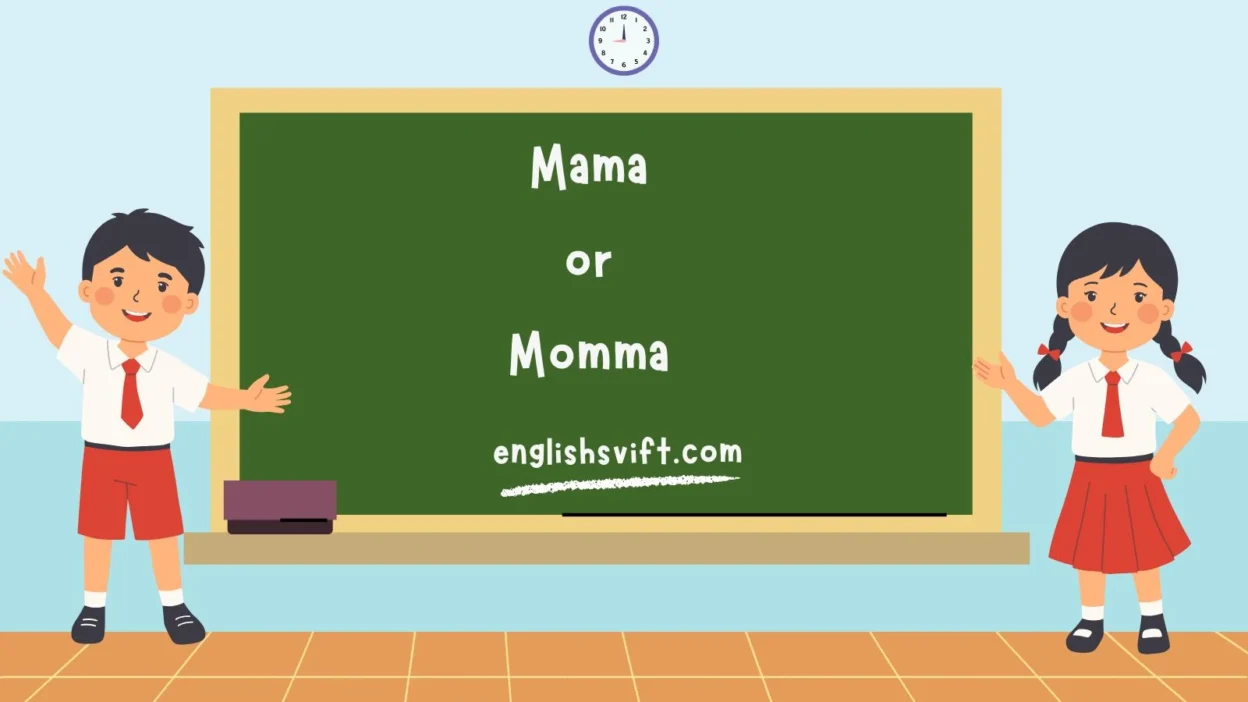Language is full of affectionate words we use for the people we love most — and for many of us, Mama or Momma sits right at the top.
But which one is actually correct? Is there even a “right” answer?
In this 2025 guide, we’ll explore the origins, spelling differences, pronunciation, cultural meanings, and even worldwide variations of the words Mama and Momma. Along the way, we’ll see how these terms have evolved from the 1500s to today, and when each one works best in conversation, literature, and public communication.
Get ready — because by the end, you’ll be able to choose the perfect term with confidence, cultural awareness, and style.
Overview: What Do “Mama” and “Momma” Mean?
At their core, Mama and Momma are affectionate, informal words for “mother.”
They’re often interchangeable in casual settings, but subtle spelling and regional norms influence which one is more common.
| Term | Meaning | Tone/Use Case |
| Mama | Informal, affectionate word for mother | Warm, international |
| Momma | Informal U.S. spelling variation | Southern, casual |
| Mamma | European spelling variation | Italy, Sweden, etc. |
Fun fact: Many languages have similar baby-talk words for “mother,” because ma sounds are among the first syllables babies can produce.
Etymology and Origins: From the 1500s to Modern Day
The earliest recorded English use of Mama dates back to the 1500s, borrowed from Latin mamma (“breast” or “mother’s figure”).
Historical milestones:
- 1707 – First appearance of mama in English literature
- 1823 – Early use of momma in U.S. letters
- 1839–1852 – Widespread use in both British and American newspapers
- 1867 – Common in sentimental poems and children’s books
From there, the two forms evolved along regional dialect lines, with momma gaining popularity in the Southern United States.
Spelling Variations Across Cultures and Regions
Different English-speaking regions have their own affectionate terms for “mother”:
| Country/Region | Common Term(s) | Notes |
| United States | Mama, Momma, Mom | “Momma” strong in Southern States |
| United Kingdom | Mum, Mummy, Mama | “Mama” more upper-class or literary |
| Australia/New Zealand | Mum, Mama | Informal, often in family contexts |
| Canada | Mom, Mum, Mama | Mix of American & British influences |
| South Africa | Mom, Mama | Non-rhotic accent affects pronunciation |
Pronunciation Differences: /ˈmɑː.mə/ vs /ˈmæ.mə/
Pronunciation can signal regional background:
- Mama – /ˈmɑː.mə/ (British, Southern U.S.) or /ˈmæ.mə/ (American Midwest)
- Momma – Often /ˈmɑː.mə/ but with longer “ah” sound in Southern accents
Example:
“Come here, Mama” sounds slightly different in Birmingham, Alabama, versus Birmingham, England.
Historical Usage: 1707, 1823, 1839, 1844, 1852, and 1867 in Literature
These terms appear in famous novels, letters, and poetry:
| Year | Example Work | Author | Term Used |
| 1707 | Early British parish records | Various | Mama |
| 1823 | U.S. personal letters | Unnamed correspondents | Momma |
| 1867 | Little Women | Louisa May Alcott | Marmee/Mama |
Mama vs Momma in American English
In the U.S., “Mama” appears in both formal literature and casual speech, but “Momma” is deeply tied to Southern culture.
Example:
- “Mama said life is like a box of chocolates.” (Forrest Gump)
- “I love you, Momma.” (Southern colloquial tone)
British and Commonwealth Variants: Mum, Mummy, and Beyond
In England, Scotland, Wales, and Northern Ireland, Mum and Mummy dominate, but Mama appears in:
- Royal contexts (Queen Elizabeth reportedly called her mother “Mama”)
- Period dramas
- Children’s literature
Influence of Southern States and Colloquial Speech
Southern U.S. culture often preserves older English forms, which is why “Momma” remains strong there.
It’s also tied to storytelling traditions, country music lyrics, and family reunions.
How “Mama” Appears in Children’s Books and Stories
From Harper Lee’s To Kill a Mockingbird to modern picture books, “Mama” carries a warm, nurturing tone.
In contrast, “Momma” in children’s stories often signals regional authenticity.
Regional Dialects: Northumbrian, Geordie, Welsh, and Irish Usage
Different UK dialects add flavor to the pronunciation and spelling:
- Northumbrian – “Mam”
- Welsh English – “Mam” or “Mama”
- Irish English – “Mammy”
Cross-Language Equivalents: Maman, Mamá, Mamãe, Máma, Mама, Umma
| Language | Term | Pronunciation Guide | Meaning |
| French | Maman | /ma.mɑ̃/ | Mother |
| Spanish | Mamá | /maˈma/ | Mother (stress last) |
| Portuguese | Mamãe | /maˈmɐ̃j/ | Mother |
| Czech | Máma | /maːma/ | Mother |
| Russian | Мама | /ˈmamə/ | Mother |
| Korean | Umma | /ʌmma/ | Mom |
Affectionate and Informal Connotations
Both terms carry warmth, but Momma can sound more intimate or Southern, while Mama feels universally affectionate.
Proper Noun Usage: Capitalization Rules
When referring to your own mother in writing, capitalize:
- “I asked Mama to help me.” ✅
- “My mama is cooking dinner.” ❌ (lowercase when generic)
Mama or Momma in Popular Culture, Movies, and Songs
- “Mama, I’m Coming Home” – Ozzy Osbourne
- “Hey Momma” – Kanye West
- “Mama Mia” – ABBA
The Role of Family, Parenting, and Emotional Connection
These words symbolize love, care, and lifelong bonds — making them staples in family conversations, birthday cards, and Mother’s Day celebrations.
Grammar and Acceptable Spellings in Public Communication
In formal documents, Mama is more accepted than Momma.
Example: A school letter might write “Dear Mama” but rarely “Dear Momma.”
When to Use “Mama” or “Momma” in Formal Contexts
- Mama – Better for formal contexts, international audiences, and creative works
- Momma – Best kept for personal letters, regional stories, and casual dialogue
Examples from Famous Literature
| Work | Author | Term Used |
| To Kill a Mockingbird | Harper Lee | Mama |
| The Color Purple | Alice Walker | Mama |
| Beloved | Toni Morrison | Mama |
Modern Trends: Social Media, Texting, and Everyday Conversations
Shortened forms (“Ma”, “Mom”) dominate texting, but Mama makes a comeback in Instagram captions and TikTok trends.
Differences in Meaning, Tone, and Emotional Impact
- Mama – Softer, wider global recognition
- Momma – Richer in Southern, intimate tone
Choosing the Right Term for Context and Audience
Ask yourself:
- Who’s the audience?
- What tone do you want?
- Is the context formal, casual, or creative?
Mama vs Momma in Marketing, Branding, and Creative Works
Brands choose based on tone:
- Mama’s Kitchen (warm, homey)
- Momma’s BBQ (Southern, rustic)
Cultural Significance and Global Recognition
These words resonate across generations, languages, and cultures, making them timeless.
Common Idioms: “Mama’s Boy,” “Mama Bear,” and More
- Mama’s boy – Overly attached to mother
- Mama bear – Fiercely protective mother
Final Takeaways: Which One Should You Use in 2025?
If you want universality, go with Mama.
If you want regional warmth or Southern charm, choose Momma.
FAQs
Q1: Is “Momma” incorrect?
A: Not at all — it’s a valid regional spelling, mostly in the U.S. South.
Q2: Is “Mama” more formal?
A: Slightly — it’s more accepted in global and professional writing.
Q3: Do British people say “Mama”?
A: Rarely; “Mum” and “Mummy” are far more common.
Q4: Which came first, Mama or Momma?
A: Mama — dating back to the 1500s, while Momma appears in the 1800s.
Q5: Can they be used interchangeably?
A: Yes, but tone, audience, and region matter.
Conclusion
Whether you write Mama or Momma, you’re expressing something deeply personal and culturally rich.
Language evolves, and so do the words we choose for those closest to us. In 2025, the “correct” choice isn’t about strict rules — it’s about connection, context, and the warmth you want to convey.



